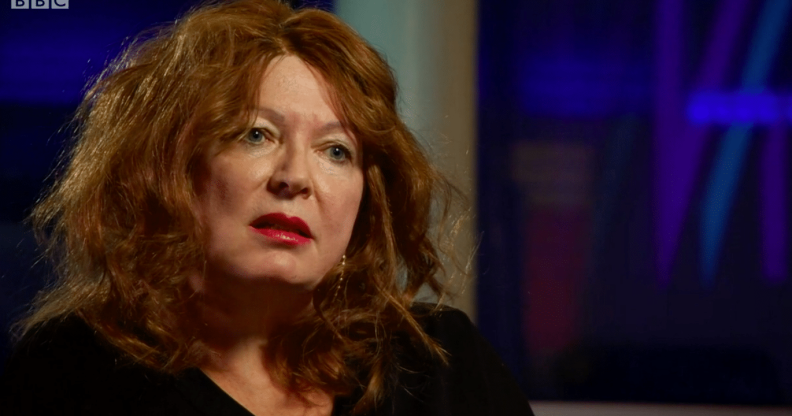Suzanne Moore defends Boris Johnson’s ‘right’ to say Muslim women ‘look like letter boxes’

Former Guardian columnist Suzanne Moore on Newsnight (BBC)
Suzanne Moore argued in defence of Boris Johnson’s right to describe Muslim women as “letterboxes” in her first TV interview since she quit The Guardian of her own volition.
The former columnist appeared on BBC’s Newsnight to talk about “cancel culture”, which she feels she has been a victim of.
Host Kirsty Wark raised the issue of inappropriate language, harking back to a controversial article by Moore that referenced “Brazilian transsexuals”.
“Language is everything,” the interviewer suggested. “When Boris Johnson described a Muslim woman in a burqa as being like a letter box – would you defend his right to say that? Would you defend your right to say anything?”
“I don’t like that remark but I think I’d be a hypocrite to say that you have this relative free speech,” Moore replied. “People should be allowed to say what they want to in newspapers.”
This notion of free speech “under attack” was the crux of Moore’s argument against The Guardian, which supposedly “blocked and sidelined” her over an article she wrote in support of the anti-trans academic Selina Todd.
Wark picked apart Moore’s reasoning for leaving the paper, noting that the offending article had been cleared by several editors and that Moore was permitted to write another anti-trans article afterwards.
“Had you actually been banned from writing about trans issues in The Guardian?” she asked pointedly.
Moore admitted that she hadn’t been banned from doing so or even asked to leave, though she described an open letter in protest against anti-trans views as “an attempt to stop” her.
“Not just to stop me but to stop those sort of views being openly debated, definitely,” she added.
When asked whether she is able to understand why Selina Todd’s views are “anathema to trans women”, Suzanne Moore dodged the question, instead replying: “I don’t understand why a professor of modern history has to go around with security”.
But Wark continued pressing the matter as the interview went on, eventually asking Moore directly: “Do you accept that ultimately you are defending rights of one group of women against another group of women?”
“No, I think I’m defending the right of women to discuss and name and explore their own experience, and that experience is often sex-based,” she said.
“I am not against anybody being trans or having the best healthcare they can have. What I am against is the idea that if you start talking about things like… periods or childbirth or menopause or these things, that you are somehow seen as excluding another group of women.”
The call for trans-inclusive language in no way prevents talking about such things or suggests that doing so is exclusionary – it only encourages a discussion that encompasses non-cisgendered experiences alongside cis women’s.
Yet Moore seemed unable to accept that the movement for trans rights does not detract from women’s rights, nor would she accept the interviewer’s suggestion that her concerns will soon be on the wrong side of history.
“Do you sometimes have to put your hands up and say, ‘I’m representing something that’s very soon going to be in the past, and actually the incoming generation has more of an enlightened attitude towards this?'” Wark asked.
“I completely accept that there are loads of younger people more enlightened than me, I live with them,” Moore said. “But I will not put up my hand and say, you know, everything that I fought for you will also have. I will say to them, you keep fighting.”
This final comment was a clear and damning indication that, despite paying lip service to intersectionality earlier in the interview, Suzanne Moore’s desire to pull up the ladder of progress behind her is far stronger.

